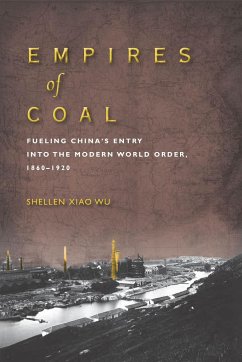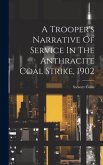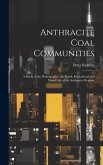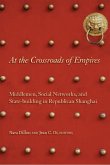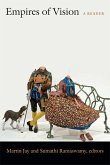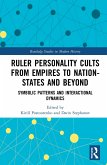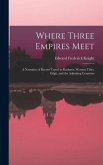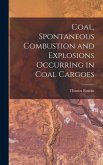- Gebundenes Buch
- Merkliste
- Auf die Merkliste
- Bewerten Bewerten
- Teilen
- Produkt teilen
- Produkterinnerung
- Produkterinnerung
Shellen Xiao Wu is Assistant Professor of History at the University of Tennessee, Knoxville.
Andere Kunden interessierten sich auch für
![A Trooper's Narrative Of Service In The Anthracite Coal Strike, 1902 A Trooper's Narrative Of Service In The Anthracite Coal Strike, 1902]() Stewart CulinA Trooper's Narrative Of Service In The Anthracite Coal Strike, 190232,99 €
Stewart CulinA Trooper's Narrative Of Service In The Anthracite Coal Strike, 190232,99 €![Anthracite Coal Communities Anthracite Coal Communities]() Peter RobertsAnthracite Coal Communities40,99 €
Peter RobertsAnthracite Coal Communities40,99 €![At the Crossroads of Empires At the Crossroads of Empires]() At the Crossroads of Empires77,99 €
At the Crossroads of Empires77,99 €![Empires of Vision Empires of Vision]() Empires of Vision179,99 €
Empires of Vision179,99 €![Ruler Personality Cults from Empires to Nation-States and Beyond Ruler Personality Cults from Empires to Nation-States and Beyond]() Ruler Personality Cults from Empires to Nation-States and Beyond185,99 €
Ruler Personality Cults from Empires to Nation-States and Beyond185,99 €![Where Three Empires Meet: A Narrative of Recent Travel in Kashmir, Western Tibet, Gilgit, and the Adjoining Countries Where Three Empires Meet: A Narrative of Recent Travel in Kashmir, Western Tibet, Gilgit, and the Adjoining Countries]() Edward Frederick KnightWhere Three Empires Meet: A Narrative of Recent Travel in Kashmir, Western Tibet, Gilgit, and the Adjoining Countries39,99 €
Edward Frederick KnightWhere Three Empires Meet: A Narrative of Recent Travel in Kashmir, Western Tibet, Gilgit, and the Adjoining Countries39,99 €![Coal, Spontaneous Combustion and Explosions Occurring in Coal Cargoes Coal, Spontaneous Combustion and Explosions Occurring in Coal Cargoes]() Thomas RowanCoal, Spontaneous Combustion and Explosions Occurring in Coal Cargoes32,99 €
Thomas RowanCoal, Spontaneous Combustion and Explosions Occurring in Coal Cargoes32,99 €-
-
-
Shellen Xiao Wu is Assistant Professor of History at the University of Tennessee, Knoxville.
Hinweis: Dieser Artikel kann nur an eine deutsche Lieferadresse ausgeliefert werden.
Hinweis: Dieser Artikel kann nur an eine deutsche Lieferadresse ausgeliefert werden.
Produktdetails
- Produktdetails
- Verlag: Stanford University Press
- Seitenzahl: 280
- Erscheinungstermin: 22. April 2015
- Englisch
- Abmessung: 236mm x 156mm x 22mm
- Gewicht: 503g
- ISBN-13: 9780804792844
- ISBN-10: 0804792844
- Artikelnr.: 41751491
- Herstellerkennzeichnung
- Libri GmbH
- Europaallee 1
- 36244 Bad Hersfeld
- gpsr@libri.de
- Verlag: Stanford University Press
- Seitenzahl: 280
- Erscheinungstermin: 22. April 2015
- Englisch
- Abmessung: 236mm x 156mm x 22mm
- Gewicht: 503g
- ISBN-13: 9780804792844
- ISBN-10: 0804792844
- Artikelnr.: 41751491
- Herstellerkennzeichnung
- Libri GmbH
- Europaallee 1
- 36244 Bad Hersfeld
- gpsr@libri.de
Shellen Xiao Wu is Assistant Professor of History at the University of Tennessee, Knoxville.
Contents and Abstracts
1Fueling Industrialization in the Age of Coal
chapter abstract
In order to understand how and why a momentous change of the Chinese
worldview occurred in the late nineteenth century, chapter 1 begins with a
discussion of pre-modern forms of geological knowledge in China
2Ferdinand von Richthofen and the Geology of Imperialism
chapter abstract
Chapter Two examines Richthofen's contributions to Chinese views of its own
mineral resources. Richthofen's career spanned the zenith of European
colonial expansion in the nineteenth century, concomitant with the golden
age of the railroads and steamers. His academic work on China connected the
geography of the eastern seaboard to the Central Asian landmass. Yet his
enduring legacy in China remains his observations of Chinese mines and
estimates of Chinese mineral potential.
3Lost and Found in Translation: Geology, Mining, and the Search for Wealth
and Power
chapter abstract
Chapter Three discusses missionary translations of geology works in the
nineteenth century. In the act of translation, geology became further
entangled with the role of science in imperialism and the wealth and power
of the West. Nineteenth century missionary translations of science in the
treaty ports tell only a small part of the story. Focusing on the
deficiencies of these translations would only miss the greater
accomplishment of these foreign and Chinese translators of Western science
texts as cultural intermediaries. These late nineteenth century
translations introduced the field of geology to the Chinese public, but in
the tumultuous political and economic environment of the late Qing period
it was mining and control over mining rights that added urgency to the
adoption of modern geology.
4Engineers as the Agents of Science and Empire, 1886-1914
chapter abstract
Chapter Four examines the large-scale modern enterprises opened in the
interior by the Chinese themselves, including influential government
figures such as Li Hongzhang and Zhang Zhidong. This chapter focuses on the
people who made possible the expansion of the first modern Chinese
industries while also promoting European influence on China's future
development-engineers who carried their skills from technical schools and
mining academies in Europe to the far reaches of empire. The German
engineers who began working for Chinese industries transitioned easily when
Germany acquired a leasehold in Shandong province in 1898.
5Nations, Empires, and Mining Rights (1895-1911)
chapter abstract
Chapter Five examines the late Qing reform of mining laws and the
nation-wide movement to reclaim mining rights. In particular, this chapter
uses as a case study the example of two German mining companies in Shandong
during the colonial period (1898-1914), and the Chinese response to the
foreign scramble for mining concessions. Like the geological surveys taking
place across the globe during nineteenth and twentieth centuries, mining
regulations became a point of tension between colonizers and the colonized.
The Chinese promulgation of mining regulations, based on Japanese and
European precedents, demonstrate that by the last years of the Qing
dynasty, they had joined the ranks of nations that viewed mineral resources
as the key to wealth and power.
6Geology in the Age of Imperialism
chapter abstract
Chapter Six examines continuities and changes in Chinese views on mining
from the imperial period through the Republican era. During the late Qing
period, control over natural resources became a symbol of sovereignty
against foreign encroachment. The study of geology became a means of
resistance against imperialism. In the Chinese discourse the positivist
views of Western geology in this period transformed into a matter of
anti-imperialist struggle with strong social Darwinian undertones.
Republican era geologists actively tried to construct a history of geology
motivated by Han nationalism, with the efforts of the late-Qing period
largely erased from their revision.
7Epilogue
chapter abstract
This chapter discusses the implications of the book and its significance
for the literature on Chinese industrialization and modern Chinese history.
1Fueling Industrialization in the Age of Coal
chapter abstract
In order to understand how and why a momentous change of the Chinese
worldview occurred in the late nineteenth century, chapter 1 begins with a
discussion of pre-modern forms of geological knowledge in China
2Ferdinand von Richthofen and the Geology of Imperialism
chapter abstract
Chapter Two examines Richthofen's contributions to Chinese views of its own
mineral resources. Richthofen's career spanned the zenith of European
colonial expansion in the nineteenth century, concomitant with the golden
age of the railroads and steamers. His academic work on China connected the
geography of the eastern seaboard to the Central Asian landmass. Yet his
enduring legacy in China remains his observations of Chinese mines and
estimates of Chinese mineral potential.
3Lost and Found in Translation: Geology, Mining, and the Search for Wealth
and Power
chapter abstract
Chapter Three discusses missionary translations of geology works in the
nineteenth century. In the act of translation, geology became further
entangled with the role of science in imperialism and the wealth and power
of the West. Nineteenth century missionary translations of science in the
treaty ports tell only a small part of the story. Focusing on the
deficiencies of these translations would only miss the greater
accomplishment of these foreign and Chinese translators of Western science
texts as cultural intermediaries. These late nineteenth century
translations introduced the field of geology to the Chinese public, but in
the tumultuous political and economic environment of the late Qing period
it was mining and control over mining rights that added urgency to the
adoption of modern geology.
4Engineers as the Agents of Science and Empire, 1886-1914
chapter abstract
Chapter Four examines the large-scale modern enterprises opened in the
interior by the Chinese themselves, including influential government
figures such as Li Hongzhang and Zhang Zhidong. This chapter focuses on the
people who made possible the expansion of the first modern Chinese
industries while also promoting European influence on China's future
development-engineers who carried their skills from technical schools and
mining academies in Europe to the far reaches of empire. The German
engineers who began working for Chinese industries transitioned easily when
Germany acquired a leasehold in Shandong province in 1898.
5Nations, Empires, and Mining Rights (1895-1911)
chapter abstract
Chapter Five examines the late Qing reform of mining laws and the
nation-wide movement to reclaim mining rights. In particular, this chapter
uses as a case study the example of two German mining companies in Shandong
during the colonial period (1898-1914), and the Chinese response to the
foreign scramble for mining concessions. Like the geological surveys taking
place across the globe during nineteenth and twentieth centuries, mining
regulations became a point of tension between colonizers and the colonized.
The Chinese promulgation of mining regulations, based on Japanese and
European precedents, demonstrate that by the last years of the Qing
dynasty, they had joined the ranks of nations that viewed mineral resources
as the key to wealth and power.
6Geology in the Age of Imperialism
chapter abstract
Chapter Six examines continuities and changes in Chinese views on mining
from the imperial period through the Republican era. During the late Qing
period, control over natural resources became a symbol of sovereignty
against foreign encroachment. The study of geology became a means of
resistance against imperialism. In the Chinese discourse the positivist
views of Western geology in this period transformed into a matter of
anti-imperialist struggle with strong social Darwinian undertones.
Republican era geologists actively tried to construct a history of geology
motivated by Han nationalism, with the efforts of the late-Qing period
largely erased from their revision.
7Epilogue
chapter abstract
This chapter discusses the implications of the book and its significance
for the literature on Chinese industrialization and modern Chinese history.
Contents and Abstracts
1Fueling Industrialization in the Age of Coal
chapter abstract
In order to understand how and why a momentous change of the Chinese
worldview occurred in the late nineteenth century, chapter 1 begins with a
discussion of pre-modern forms of geological knowledge in China
2Ferdinand von Richthofen and the Geology of Imperialism
chapter abstract
Chapter Two examines Richthofen's contributions to Chinese views of its own
mineral resources. Richthofen's career spanned the zenith of European
colonial expansion in the nineteenth century, concomitant with the golden
age of the railroads and steamers. His academic work on China connected the
geography of the eastern seaboard to the Central Asian landmass. Yet his
enduring legacy in China remains his observations of Chinese mines and
estimates of Chinese mineral potential.
3Lost and Found in Translation: Geology, Mining, and the Search for Wealth
and Power
chapter abstract
Chapter Three discusses missionary translations of geology works in the
nineteenth century. In the act of translation, geology became further
entangled with the role of science in imperialism and the wealth and power
of the West. Nineteenth century missionary translations of science in the
treaty ports tell only a small part of the story. Focusing on the
deficiencies of these translations would only miss the greater
accomplishment of these foreign and Chinese translators of Western science
texts as cultural intermediaries. These late nineteenth century
translations introduced the field of geology to the Chinese public, but in
the tumultuous political and economic environment of the late Qing period
it was mining and control over mining rights that added urgency to the
adoption of modern geology.
4Engineers as the Agents of Science and Empire, 1886-1914
chapter abstract
Chapter Four examines the large-scale modern enterprises opened in the
interior by the Chinese themselves, including influential government
figures such as Li Hongzhang and Zhang Zhidong. This chapter focuses on the
people who made possible the expansion of the first modern Chinese
industries while also promoting European influence on China's future
development-engineers who carried their skills from technical schools and
mining academies in Europe to the far reaches of empire. The German
engineers who began working for Chinese industries transitioned easily when
Germany acquired a leasehold in Shandong province in 1898.
5Nations, Empires, and Mining Rights (1895-1911)
chapter abstract
Chapter Five examines the late Qing reform of mining laws and the
nation-wide movement to reclaim mining rights. In particular, this chapter
uses as a case study the example of two German mining companies in Shandong
during the colonial period (1898-1914), and the Chinese response to the
foreign scramble for mining concessions. Like the geological surveys taking
place across the globe during nineteenth and twentieth centuries, mining
regulations became a point of tension between colonizers and the colonized.
The Chinese promulgation of mining regulations, based on Japanese and
European precedents, demonstrate that by the last years of the Qing
dynasty, they had joined the ranks of nations that viewed mineral resources
as the key to wealth and power.
6Geology in the Age of Imperialism
chapter abstract
Chapter Six examines continuities and changes in Chinese views on mining
from the imperial period through the Republican era. During the late Qing
period, control over natural resources became a symbol of sovereignty
against foreign encroachment. The study of geology became a means of
resistance against imperialism. In the Chinese discourse the positivist
views of Western geology in this period transformed into a matter of
anti-imperialist struggle with strong social Darwinian undertones.
Republican era geologists actively tried to construct a history of geology
motivated by Han nationalism, with the efforts of the late-Qing period
largely erased from their revision.
7Epilogue
chapter abstract
This chapter discusses the implications of the book and its significance
for the literature on Chinese industrialization and modern Chinese history.
1Fueling Industrialization in the Age of Coal
chapter abstract
In order to understand how and why a momentous change of the Chinese
worldview occurred in the late nineteenth century, chapter 1 begins with a
discussion of pre-modern forms of geological knowledge in China
2Ferdinand von Richthofen and the Geology of Imperialism
chapter abstract
Chapter Two examines Richthofen's contributions to Chinese views of its own
mineral resources. Richthofen's career spanned the zenith of European
colonial expansion in the nineteenth century, concomitant with the golden
age of the railroads and steamers. His academic work on China connected the
geography of the eastern seaboard to the Central Asian landmass. Yet his
enduring legacy in China remains his observations of Chinese mines and
estimates of Chinese mineral potential.
3Lost and Found in Translation: Geology, Mining, and the Search for Wealth
and Power
chapter abstract
Chapter Three discusses missionary translations of geology works in the
nineteenth century. In the act of translation, geology became further
entangled with the role of science in imperialism and the wealth and power
of the West. Nineteenth century missionary translations of science in the
treaty ports tell only a small part of the story. Focusing on the
deficiencies of these translations would only miss the greater
accomplishment of these foreign and Chinese translators of Western science
texts as cultural intermediaries. These late nineteenth century
translations introduced the field of geology to the Chinese public, but in
the tumultuous political and economic environment of the late Qing period
it was mining and control over mining rights that added urgency to the
adoption of modern geology.
4Engineers as the Agents of Science and Empire, 1886-1914
chapter abstract
Chapter Four examines the large-scale modern enterprises opened in the
interior by the Chinese themselves, including influential government
figures such as Li Hongzhang and Zhang Zhidong. This chapter focuses on the
people who made possible the expansion of the first modern Chinese
industries while also promoting European influence on China's future
development-engineers who carried their skills from technical schools and
mining academies in Europe to the far reaches of empire. The German
engineers who began working for Chinese industries transitioned easily when
Germany acquired a leasehold in Shandong province in 1898.
5Nations, Empires, and Mining Rights (1895-1911)
chapter abstract
Chapter Five examines the late Qing reform of mining laws and the
nation-wide movement to reclaim mining rights. In particular, this chapter
uses as a case study the example of two German mining companies in Shandong
during the colonial period (1898-1914), and the Chinese response to the
foreign scramble for mining concessions. Like the geological surveys taking
place across the globe during nineteenth and twentieth centuries, mining
regulations became a point of tension between colonizers and the colonized.
The Chinese promulgation of mining regulations, based on Japanese and
European precedents, demonstrate that by the last years of the Qing
dynasty, they had joined the ranks of nations that viewed mineral resources
as the key to wealth and power.
6Geology in the Age of Imperialism
chapter abstract
Chapter Six examines continuities and changes in Chinese views on mining
from the imperial period through the Republican era. During the late Qing
period, control over natural resources became a symbol of sovereignty
against foreign encroachment. The study of geology became a means of
resistance against imperialism. In the Chinese discourse the positivist
views of Western geology in this period transformed into a matter of
anti-imperialist struggle with strong social Darwinian undertones.
Republican era geologists actively tried to construct a history of geology
motivated by Han nationalism, with the efforts of the late-Qing period
largely erased from their revision.
7Epilogue
chapter abstract
This chapter discusses the implications of the book and its significance
for the literature on Chinese industrialization and modern Chinese history.

